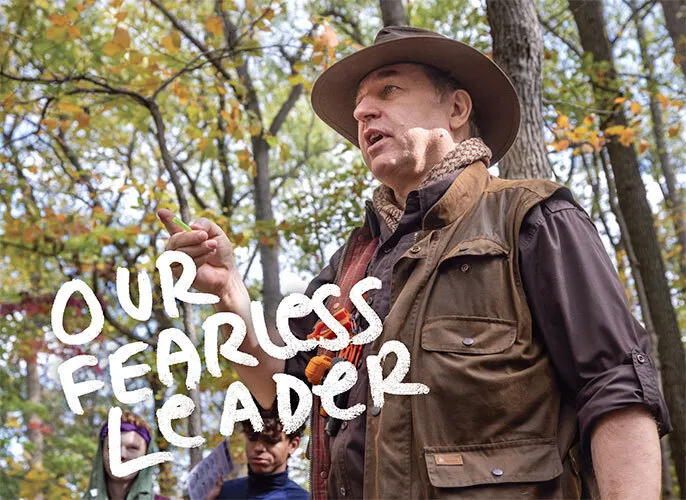- March 13, 2024
- By Maggie Haslam
MY CAR IS ON FIRE. I stand stunned on the shoulder of a lonesome wooded road west of Baltimore. What started as a ping of the check engine light had quickly escalated to a Volkswagen inferno that now illuminates the darkening sky. With no sign of civilization, the temperature plummeting and my cell phone—left on the passenger seat—burned to an iCrisp, I realize I could be stranded for the night.
In the glow of my car’s torched carcass, I spot a garbage bag tossed to the side of the road. Inside, I find a hodgepodge of items: a wire hanger, an unused tampon, an empty water bottle and a long-expired can of sardines. None seems useful, but I’ll soon learn that surviving—in life and in business—requires a little improvisation.

THIS DIDN’T ACTUALLY HAPPEN. It’s the scenario Clinical Professor Oliver Schlake lays out on a balmy morning to me and nearly 100 freshmen in Patapsco Valley State Park near Ellicott City, Md. The objective: Survive a hypothetical night in the frigid woods making do with only the items found in a discarded trash bag.
It’s all part of Schlake’s “Creative Problem Solving” class in the Business, Society and the Economy (BSE) program of College Park Scholars, where students are charged to think creatively and quickly, and adapt through unconventional exercises. (The week before our jaunt in the woods, Schlake assigned students to recreate a famous piece of art using only objects found in their dorm rooms.)
“We never really know what’s going to happen in class,” says business major Jack Campbell ’27.
Aside from a handful of Eagle Scouts and die-hard fans of “Naked and Afraid,” the majority of students enter the woods unsure what to expect.
“I want to engage them to get their hands dirty, get involved,” says Schlake. “This is about moving them from being an observer to being in charge. It’s a critical skill for the world we live in.”
STOP THE BLEEDING ON THE LEFT LEG. Build a shelter. Make a fire. Boil water. Furnish a weapon. Peering into the garbage bag, my team assessed our random supplies, which ranged from a birthday candle to a surgical mask. Anything we could find in the woods is fair game; for us, that includes rocks, branches and a dented Blue Moon beer can.
With just one hour to accomplish all of the tasks, we split up. Four of us spend 20 precious minutes manipulating a tarp into a snappy-looking shelter, using vines pulled from the ground to secure it taut between three trees. Schlake praises us for employing the vines—not that it would matter when the sun went down. He notes that the tarp’s lack of coverage along the sides means we would freeze to death within hours.
“You want the tarp to be low to the ground and completely surrounding you,” he coaches us. “It should be almost like a cocoon.”
Schlake, an entrepreneur and consultant who’s been at the Robert H. Smith School of Business since 2006, is a faculty favorite among students for his hands-on, out-of-the-box courses, including a product prototyping class that partners with big names like Bass Pro Shops, Under Armour and Children’s National Hospital. A seasoned outdoorsman, he began incorporating survival skills into his teaching—as well as in exercises with business leaders around the world. Schlake debuted “Creative Problem Solving” in 2014 for Smith’s MBA orientation, and when he was named BSE director in 2022, it became the inaugural class.
Surviving in the woods is a lot like surviving in the business world: One must quickly adapt, improvise and prioritize. The same basic principles can be applied in other professions when facing uncertain or volatile scenarios, where employees have just a day or two to pivot operations. Schlake says people tend to suffer from functional fixedness bias: limiting yourself to an object’s intended use. In resource-strapped business settings, this can lead to paralysis. The cure is improvisation.
“The better you are, the more you’ve done this, you’ll revert to it as a solid skill set,” he says. “And Mother Nature offers a beautiful feedback system.”
“WHY IS SHE GOING TO BE DEAD IN 30 MINUTES?” SCHLAKE ASKS. We gathered around the Green Team’s site, 85 stupefied people trying to answer his riddle. The students had built a decent shelter, fashioned a medieval-style flail with a rope and rock, and created a signal by banging two cans together, a tactic our team couldn’t believe eluded us. “She’s got the tourniquet on her right leg, not her left,” he says.
In the end, my team squeaks out sixth place among 10 teams, soothing our egos with a civilized barbecue of burgers and s’mores. We survived—and will never look at a Sharpie the same again. (Spoiler: You can blow across the cap to create an ear-piercing whistle.)
“This helped me understand that while I might have limitations, I can take the things around me and use them in entirely new ways,” says Brianna Prempeh ’27, a neuroscience and business double major. “It’s taught me look at look at things from a different perspective.”
Topics
Campus & CommunityTags
Student Experience